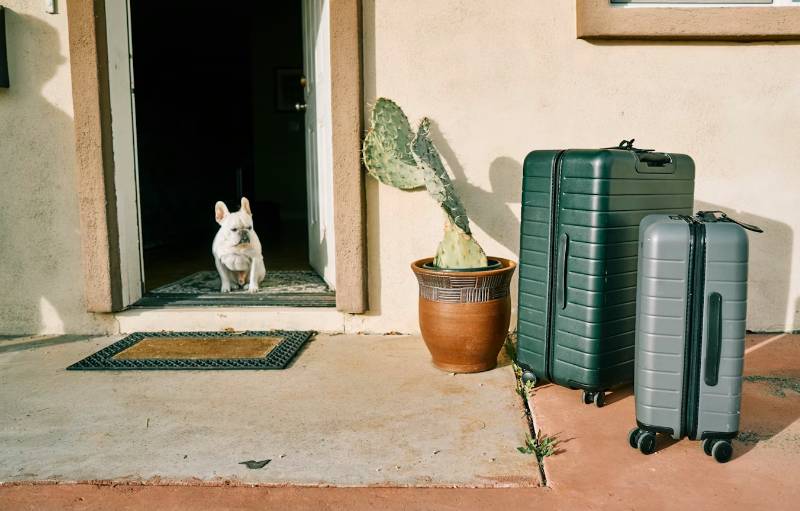- Region
- Vega baja
- Marina Alta
- Marina Baixa
- Alicante
- Baix Vinalopo
- Alto & Mitja Vinalopo
-
ALL TOWNS
- ALICANTE TOWNS
- Albatera
- Alfaz Del Pi
- Alicante City
- Alcoy
- Almoradi
- Benitatxell
- Bigastro
- Benferri
- Benidorm
- Calosa de Segura
- Calpe
- Catral
- Costa Blanca
- Cox
- Daya Vieja
- Denia
- Elche
- Elda
- Granja de Rocamora
- Guardamar del Segura
- Jacarilla
- Los Montesinos
- Orihuela
- Pedreguer
- Pilar de Horadada
- Playa Flamenca
- Quesada
- Rafal
- Redovan
- Rojales
- San Isidro
- Torrevieja
- Comunidad Valenciana
article_detail
Taking a pet to Spain: Rules and costs for bringing a dog or cat to Spain
The price and logistics will depend largely on whether you’re arriving in Spain from an EU or non-EU country

Image: Unsplash
Are you planning a move to Spain? Or maybe you’re coming here on holiday but would like to bring your pet along? Any trip is sure to be enhanced by having your canine or feline companion along for the ride, but it’s important to be aware of the rules and requirements to ensure a smooth journey for you and your four-legged friend.
Let’s go through the essentials step by step, with information courtesy of Global Relocation - Spain, the experts in removals and moving services, including moving pets abroad and dealing with all the paperwork.
Pet travel rules in a nutshell
First, it’s important to understand the difference between pet travel and commercial travel. If you’re travelling with five or fewer pets (‘pets’ refers to dogs, cats and ferrets), and they are not for commercial purposes or transfer of ownership, it is considered pet travel.
Your pet must be accompanied by you or someone responsible for them, either on the same transport or within five days of your trip.
Bringing your pet to Spain from an EU country
In general, to bring your cat, dog or ferret into Spain, it must:
- Be at least 15 weeks old, and the rabies vaccine must have been administered at least 21 days before travel.
- Be identified with a microchip. ID tattoos are allowed if they were done before July 2011, but they must be legible.
- Have a European passport for the movement of pets. The sections “Owner”, “Animal description”, “Marking”, “Issuance of passport” and “Rabies vaccination” must be completed.
- The sections Serological test, Treatment against ticks, Treatment against Echinococcus, Other vaccinations, Clinical examination, Legalization and Others are not mandatory for movements from other EU Member States to Spain.
It’s worth noting that several countries (Andorra, Switzerland, Faroe Islands, Gibraltar, Greenland, Liechtenstein, Monaco, Norway, San Marino, Vatican City, Iceland and Northern Ireland) are considered equivalent to the European Union in health terms, so entry into the EU from any of these countries is considered an intra-community movement.
This agreement is in line with Part I of Annex II of R (EU) 577/2013.
Bringing a pet to Spain from a non-EU country for the first time
To move your pet to Spain from Britain or another country outside of the EU, such as the United Kingdom or United States, you must bring your pet through one of the designated Entry Points (December 4, 2023) for travellers, and declare to the Tax Office of the Guardia Civil that you are travelling with a pet, presenting all the necessary the documentation for the animal.
In cases where a European passport is not available for the movement of pets, the animals must be accompanied by:
- A zoosanitary certificate, which must be signed by an official veterinarian of the third country and submitted in Spanish.
- A declaration form.
- Certified copy of the identification and vaccination data of the animal(s).
You can find templates for all of these certificates here.
In addition, your pet must:
- Be identified with a microchip or tattoo (if done before 03/07/2011 and still legible).
- Be vaccinated against rabies with a vaccine valid at the time of travel.
- If you come from a country not listed in Annex II of Regulation (EU) 577/2013, have undergone a serological test against rabies in an authorised laboratory (more on this below).
Returning your pet to Spain after visiting a non-EU country
When returning to Spain after a trip, the animal and all of its documents must again be declared, as above.
If you are travelling to a country not listed in Annex II (a country at risk of rabies), there are some additional considerations:
- Your pet must undergo a serological test for rabies at an authorised laboratory before travelling.
- The result of this test will be reflected by your veterinarian in the passport and must be equal to or greater than 0.5 IU/ml.
- At least 30 days after vaccination against rabies (in the case of primary vaccination) a blood sample must be taken from the animal to verify that the level of post-vaccination antibodies is sufficient, that is, equal to or greater than 0.5 IU/ml.
- The entry of the animal will only be authorised after 3 months (see frequently asked questions ) from the date of the blood sample.
- Therefore, the minimum age of an animal coming from a country with a risk of rabies will be 7 months.
With regular boosters, the serological test will be valid throughout the life of the animal.
How much does all of this cost?
The costs associated with preparing your pet for travel to Spain can vary widely depending on your country of origin, but here is a general guideline to give you an idea:
- Microchipping usually costs around 20 euros.
- Rabies vaccination is mandatory for entry into Spain. If it's your pet's first vaccination, allow for 21 days before travel. A booster shot may be given on the same day of travel. The cost of vaccination can range from 25 euros to 100 euros, depending on your veterinarian.
- If you're arriving from a non-EU country, you'll need a health certificate and declaration form for your pet. A visit to your vet for these documents can cost anywhere from 20 euros to 100 euros.
- As for the EU pet passport, the cost will depend on the expenses of the above-mentioned documents, ranging from 20 euros to 448 euros.
- Travelling by ferry? Your pet will be considered a car passenger. Opting for air travel? Expect to pay approximately 40 euros-120 euros per pet, although prices vary across airlines.
- If you prefer a pet transportation company to handle the travel arrangements and administrative tasks like passports, vaccination and health certificates, fees typically start from 300 euros and can go up to 3,000 euros or more, depending on the specifics.
The list of requirements for travelling with your beloved pets definitely isn’t a short one, but the end result is absolutely worth it. Remember, most registered vets in the UK and the EU are very familiar with the rules, and they’ll be more than happy to guide your through the process so that you and your furry friend can make the most of your time in Spain.
Alternatively, you can let Global handle the whole process for you. Just use the contact details below to get a FREE, no obligation quote for moving your pet overseas:
staff.inc.ali
Address
Relocation Management Spain SL, Calle Casto Loarce 7, Getafe, Madrid, 28906Tel: +34 918 093 758
Loading
Find storage in Spain, international removals and movers from this highly recommended relocation company in Spain
With over 35 years of experience, the removal, relocation and immigration experts at Global Relocation - Spain offer the highest quality services for expats moving to a different country, either to or from Spain.
They are the top-rated relocation company based in Spain, with 5 stars in Google reviews, and are the highest ranked mover in Spain according to www.moveaide.com.

The service falls under three categories: Removals, Relocation and Immigration.
International movers

Global Relocation - Spain has its own facilities in Madrid and Barcelona with over 2000m2 of warehousing, as well as offices in key locations in Valencia, Alicante and Malaga. They have their own fleet of moving lorries to ensure that your furniture reaches its destination in perfect condition, and use a containerised storage system and custom-made wooden crates for moving.
- Online tracking service
- Door-to-door moving service
- Quality packing and unpacking
- Sea/air/road transport
- Customs clearance
- Move management
- Shipment insurance policy & worldwide insurance coverage
- Containerised storage
Relocations

The moving experts can also help you find a house in your chosen destination, rent furniture, register a car and more.
- Home search
- Temporary house
- Furniture rental
- Tenancy management
- Vehicle registration & MOT
- Settling in
- Orientation
- Intercultural & language training
- Repatriation service
- School search
- VIP concierge desk
Immigration
With their immigration service, they can provide you with residency documents, visas, work permits and guides on your new destination, among others.
- Residence & work permits
- Corporate level consulting
- Assessment consultations
- Consular services
- Employment permits
- Compliance support
- Local culture training
- Guidance & advisory at destination
Request a personalised quote for your international move in a maximum of 48 hours using the contact box above, or the following contact details:
Chris Rosemeyer
Telephone: +34 918 093 758
Email: info@gcrelo.com
Website: www.globalinternational.com
Contact Murcia Today: Editorial 000 000 000 /
Office 000 000 000




















